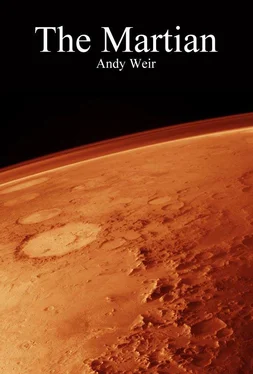LOG ENTRY: SOL 6
I’m pretty much fucked.
That’s my considered opinion.
Fucked.
Six days in to what should be a greatest two months of my life, and it’s turned in to a nightmare.
I don’t even know who’ll read this. I guess someone will find it eventually. Maybe a hundred years from now.
For the record… I didn’t die on Sol 6. Certainly the rest of the crew thought I did, and I can’t blame them. Maybe there’ll be a day of national mourning for me, and my Wikipedia page will say “Mark Watney is the only human being to have died on Mars.”
And it’ll be right, probably. Cause I’ll surely die here. Just not on Sol 6 when everyone thinks I did.
Let’s see… where do I begin?
The Ares program. Mankind reaching out to Mars to send people to another planet for the very first time and expand the horizons of humanity blah, blah, blah. The Ares 1 crew did their thing and came back heroes. They got the parades and fame and love of the world.
Ares 2 did the same thing, in a different location on Mars. They got a firm handshake and a hot cup of coffee when they got home.
Ares 3. Well. That was my mission. Well, not mine per se. Commander Lewis was in charge. I was just one of her crew. Actually, I was the very lowest ranked member of the crew. I would only be “in command” of the mission if I were the only remaining person.
What do you know? I’m in command.
I wonder if this log will be recovered before the rest of the crew die of old age? I presume they got back to Earth all right. Well, guys, if you’re reading this: It wasn’t your fault. You did what you had to do. In your position I would have done the same thing. I don’t blame you, and I’m glad you survived.
I guess I should explain how Mars missions work, for any layman who may be reading this. We got to earth orbit the normal way, through an ordinary ship to Hermes. All the Ares missions use Hermes to get to and from Mars. It’s really big and cost a lot so NASA only built one.
Once we got to Hermes, four additional unmanned missions brought us fuel and supplies while we prepared for our trip. Once everything was a go, we set out for Mars. But not very fast. Gone are the days of heavy chemical fuel burns and trans-Mars injection orbits.
Hermes is powered by ion engines. They throw Argon out the back of the ship really fast to get a tiny amount of acceleration. The thing is, it doesn’t take much reactant mass, so a little Argon (and a nuclear reactor to power things) let us accelerate constantly the whole way there. You’d be amazed at how fast you can get going with a tiny acceleration over a long time.
I could regale you with tales of how we had great fun on the trip, but I won’t. We did have fun, but I don’t feel like reliving it right now. Suffice it to say we got to Mars 124 days later without strangling each other.
From there, we took the MDV (Mars Descent Vehicle) to the surface. The MDV is basically a big can with some light thrusters and parachutes attached. Its sole purpose is to get six humans from Mars orbit to the surface without killing any of them.
And now we come to the real trick of Mars exploration: Having all our shit there in advance.
A total of 14 unmanned missions deposited everything we would need for surface operations. They tried their best to land all the supply vessels in the same general area, and did a reasonably good job. Supplies aren’t nearly so fragile as humans and can hit the ground really hard. But they tended to bounce around a lot.
Naturally, they didn’t send us to Mars until they’d confirmed all the supplies had made it to the surface and their containers weren’t breached. Start to finish, including supply missions, a Mars mission takes about 3 years. In fact, there were Ares 3 supplies en route to Mars while the Ares 2 crew were on their way home.
The most important piece of the advance supplies, of course, was the MAV. The “Mars Ascent Vehicle.” That was how we would get back to Hermes after surface operations were complete. The MAV was soft-landed (as opposed to the balloon bounce-fest the other supplies had). Of course, it was in constant communication with Houston, and if there were any problems with it, we would pass by Mars and go back to Earth without ever landing.
The MAV is pretty cool. Turns out, through a neat set of chemical reactions with the Martian atmosphere, for every kilogram of hydrogen you bring to Mars, you can make 13 kilograms of fuel. It’s a slow process, though. It takes 24 months to fill the tank. That’s why they sent it long before we got here.
You can imagine how disappointed I was when I discovered the MAV was gone.
It was a ridiculous sequence of events that led to me almost dying. Then an even more ridiculous sequence that led to me surviving.
The mission is designed to handle sandstorm gusts up to 150 km/hr. So Houston got understandably nervous when we got whacked with 175 km/hr winds. We all got in our suits and huddled in the middle of the Hab, just in case it lost pressure. But the Hab wasn’t the problem.
The MAV is a spaceship. It has a lot of delicate parts. It can put up with storms to a certain extent but it can’t just get sandblasted forever. After an hour and a half of sustained wind, NASA gave the order to abort. Nobody wanted to stop a month-long mission after only six days but if the MAV took any more punishment we’d all get stranded down here.
We had to go out in the storm to get from the Hab to the MAV. That was going to be risky, but what choice did we have?
Everyone made it but me.
Our main communications dish, which relayed signals from the Hab to Hermes, acted like a parachute, getting torn from its foundation and carried with the torrent. Along the way, it crashed through the reception antenna array. Then one of those long thin antennae slammed in to me end first. It tore through my suit like a bullet through butter and I felt the worst pain of my life as it ripped open my side. I vaguely remember suddenly having the wind knocked out of me (pulled out of me, really) and my ears popping painfully as the pressure of my suit escaped.
The last thing I remember was seeing Johanssen hopelessly reaching out toward me.
I awoke to the oxygen alarm in my suit. A steady, obnoxious beeping that eventually roused me from a deep and profound desire to just fucking die.
The storm had abated; I was face down, almost totally buried in sand. As I groggily came to, I wondered why I wasn’t more dead.
The antenna had enough force to punch through the suit and my side, but then it got stopped by my pelvis. So there was only one hole in the suit (and a hole in me, of course).
I had been knocked back quite a ways and rolled down a steep hill. Somehow I landed face down, which forced the antenna to a strongly oblique angle that put a lot of torque on the hole in the suit. It made a weak seal.
Then, the copious blood from my wound trickled down toward the hole. As the blood reached the site of the breach, the water in it quickly evaporated from the airflow and low pressure, leaving only a gunky residue behind. More blood came in behind it and was also reduced to gunk. Eventually, the blood sealed the gaps around the hole and reduced the leak to something the suit could counteract.
The suit did its job admirably. Seeing the drop in pressure, it constantly flooded itself with air from my nitrogen tank to equalize. Once the leak became manageable, it only had to trickle new air in slowly the relieve the air lost.
After a while, the CO2 (carbon dioxide) absorbers in the suit were expended. That’s really the limiting factor to life support. Not the amount of oxygen you bring with you, but the amount of CO2 you can remove. In the Hab, we had the Oxygenator, a large piece of equipment that could break CO2 apart and give the oxygen back. But the spacesuits had to be portable, so they used a simple chemical absorption process with expendable filters. I’d been asleep long enough that my filters were useless.
Читать дальше

![Энди Вейр - Артемида [ёфицировано]](/books/31723/endi-vejr-artemida-eficirovano-thumb.webp)



![Энди Вейр - Проект Радуйся, Мария [ЛП]](/books/385212/endi-vejr-proekt-radujsya-mariya-lp-thumb.webp)
![Энди Вейр - Артемида [litres]](/books/415474/endi-vejr-artemida-litres-thumb.webp)
![Энди Вейр - Вперед [сборник litres]](/books/433676/endi-vejr-vpered-sbornik-litres-thumb.webp)